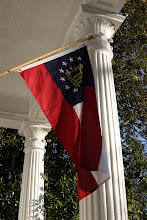Heavy Rain Hits Haiti's Quake-Ravaged Capital
The first heavy rain since the earthquake doused Haiti's capital Thursday night, soaking hundreds of thousands of homeless in a city where barren hillsides and weakened buildings are threatening to give way.
The storm hit as relief officials changed tack on dealing with quake survivors, delaying plans to build big refugee camps outside Port-au-Prince. Instead, they want the homeless to pack up their tents and tarps and return to destroyed neighborhoods.
People dashed for shelter down streets streaming with runoff from the driving tropical rain. The downpour swept trash along roadside gutters, clogging drains and turning depressions into ponds.
Some women stripped naked and took advantage of the downpour to take a shower - there are no bathing facilities in overcrowded tent camps that officials want to move people out of.
Snowstorm In Northeast, Rain Pounds New England
A slow-moving winter storm packing heavy, wet snow and potentially flooding rain spread over the Northeast on Thursday, disrupting air traffic and closing schools. Utility companies braced for possible widespread power outages overnight due to high winds and toppled trees.
The strongest wind and heaviest snow was forecast for late Thursday and early Friday, with a foot or more of snow and high winds expected from southeastern Pennsylvania, into New Jersey and New York and up to parts of New England.
Parts of western Maine received nearly a foot a snow, while Philadelphia received a dusting. About 4 inches of snow fell in New York City, where a man was killed by a falling snow-laden tree branch in Central Park -- one of at least three deaths being blamed on the storm.
In parts of southern and mid-coastal Maine more than 3 inches of rain had fallen and forecasters say some areas could get more than 7 inches. The Presumpscot River in Westbrook was expected to crest at 9 feet over flood stage by Friday afternoon. The river in the flood-prone New Hampshire town of Goffstown was nearing flood stage and residents were told to prepare for possible evacuation.
Hundreds of flights were canceled at major East Coast airports.
The latest blast of winter was expected to linger more than 24 hours, meaning more headaches Friday. More snow is predicted for much of the region Saturday, too. The National Weather Service put much of the East Coast under wind advisories and warnings until 7 a.m. Friday.
3 Gold Medals Stolen From 1972 Olympian
Three gold medals have been stolen from the Arizona home of former Olympic swimmer Melissa Belote, who won them as a 15-year-old at the 1972 games in Munich.
Belote, now 53, normally kept the medals in a safety-deposit box, but had put them underneath clothes in a dresser drawer at her Tempe home after taking them to an elementary school for a presentation.
Tempe police Sgt. Steve Carbajal said Thursday that one or more thieves broke into Belote's home sometime during the day Wednesday by prying open a back window. They stole the medals, an iPod, some cash, and jewelry, but left other things like computers and TVs.
Belote, who now coaches children and teens in swim, told The Associated Press on Thursday that when she found out her medals were taken, she "wept like a baby."
If melted down, the medals wouldn't be worth much because they're not made of real gold but are actually silver plated with gold. It's unclear how much they'd be worth in tact.
The medals are engraved with Belote's name, and have Munich and two Xs on them to represent the 20th Olympiad. Belote, who grew up in Springfield, Va., was an All-America swimmer at Arizona State University and was named the nation's top college swimmer in 1977.
Coroner: Anemia, Meds Left Murphy Vulnerable
Severe anemia left actress Brittany Murphy weakened and vulnerable to pneumonia and the prescription medications she was using to treat it, according to an autopsy report released Thursday.
The report stated Murphy's menstrual period contributed to her anemia and left her in a weakened state and vulnerable to infection. It also contributed the effects that a host of drugs, including hydrocodone and acetaminophen, had on the 32-year-old actress, according to the report.
Coroner's officials had already concluded Murphy's death was accidental, but likely preventable. She died after collapsing in her Hollywood Hills home on Dec. 20.
The report notes that the medications found in Murphy's system were consistent with treatment of a cold or respiratory infection. Murphy's mother and husband had reported the actress was ill with flu-like symptoms in the days before her death.
An autopsy found no evidence that Murphy abused drugs. Investigators found numerous prescription medications in the actress' home, which she shared with her mother, Sharon, and husband, Simon Monjack.
The actress was taking anti-seizure medications and hydrocodone, the report said.
Murphy had been complaining of severe abdominal pain for seven to 10 days before her death. The report states her family thought it was a result of her menstrual period, which they told investigators was often severe.
13-Year-Old Takes School Buses On Joyride
A 13-year-old boy went on a late-night joyride, breaking into school buses and driving them in circles in the Hall County bus barn on Atlanta Highway in Gainesville, Georgia, according to Jeff Strickland of the Hall County Sheriff's Office.
"It's very unusual and out of the ordinary," said Mike Garner of Hall County Schools.
Investigators said the boy broke into and drove four or five Hall County buses on Feb. 22 and stole the keys when he left. Surveillance cameras show the boy scaling the lot's chain fence and driving the buses around. Bus drivers arriving for work noticed their buses weren't where they left them.
Investigators said the boy was on the lot for at least 45 minutes, going from bus to bus. Sheriff's deputies found the stolen school bus keys in an abandoned house near the boy's home. Officials said the boy also went on a crime spree the following day, breaking into a home, stealing a cell phone and taking the homeowner's car for a joyride. The boy was caught hours later breaking into another house.
The boy is being held in juvenile detention, facing numerous charges.
A Virginia couple has been reunited with their German shepherd, which was found hundreds of miles from home in Florida.
Pamela Holt, of Stuart, Va., says she thought DeLand Animal Control Officer Gary Thomas was playing a "mean trick" when he called to say he found 18-month old Deacon. The dog had been missing since December. The Holts thought their dog had died.
According to police reports, a convenience store clerk saw Deacon and another dog running in traffic on Feb. 18. The clerk called authorities and the dogs were taken to a kennel.
Deacon had a microchip implanted, which helped Thomas track down the Holts. The couple arrived in Florida to pick up Deacon this weekend.















































